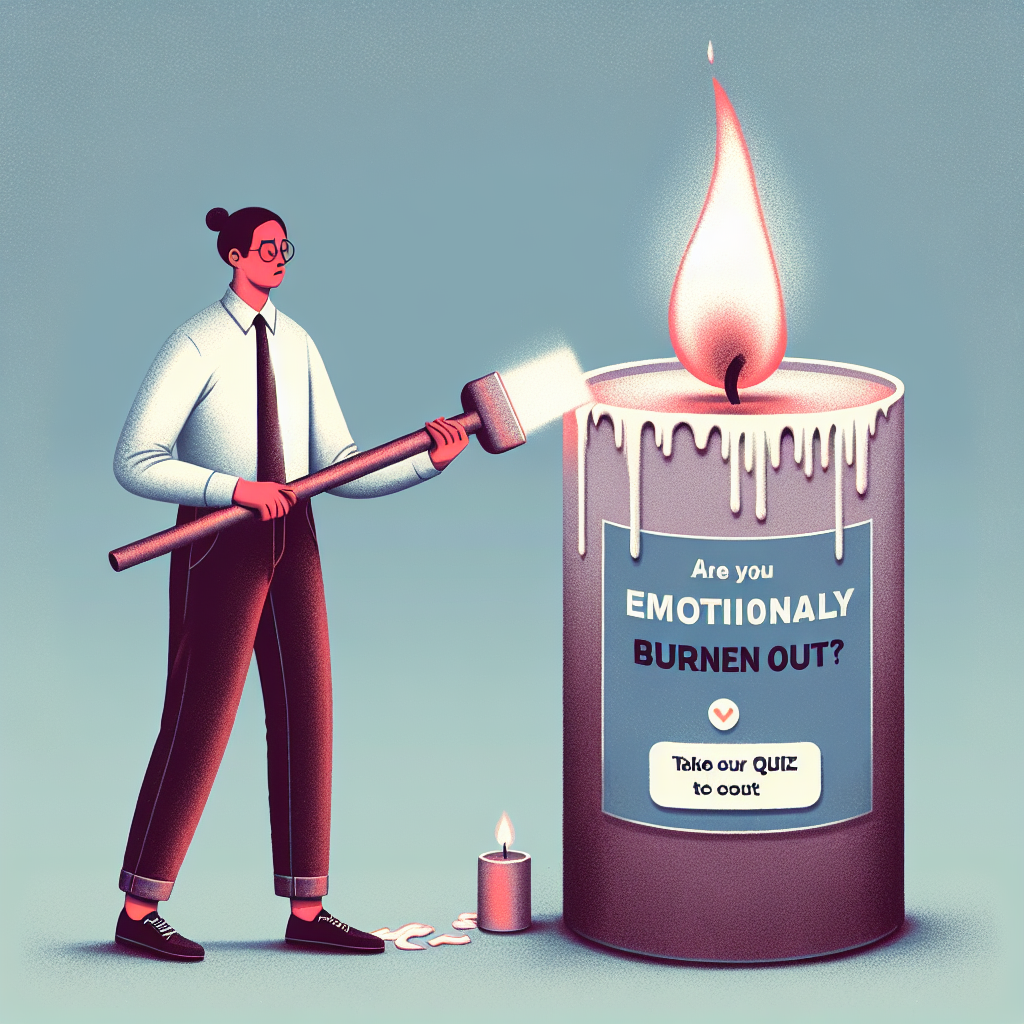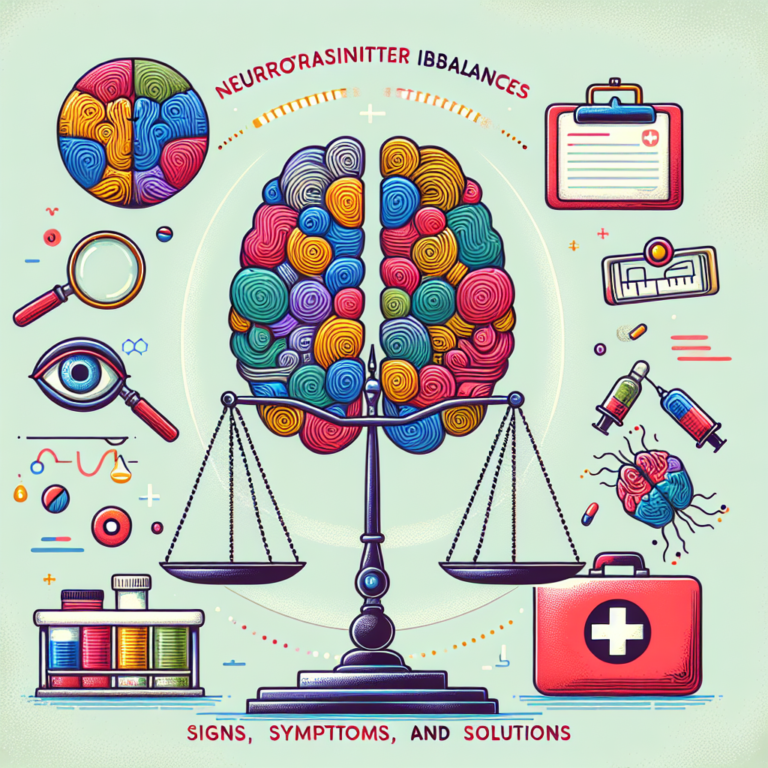
Introduction
In today’s fast-paced world, the pressures of modern life can often lead us to experience emotional fatigue, leaving us drained and unfulfilled. If you find yourself feeling overwhelmed, detached, or unable to meet daily demands, you may be facing a condition known as emotional burnout. Understanding this phenomenon is crucial, not just for personal awareness, but also for long-term mental health.
To help you gauge your emotional well-being, we’ve created a comprehensive guide that includes an insightful quiz: Are You Emotionally Burned Out? Take Our Quiz to Find Out. This resource is designed to provide clarity and actionable steps to reclaim your emotional health.
Understanding Emotional Burnout
Emotional burnout is characterized by feelings of depletion, emotional exhaustion, and reduced performance. It often stems from prolonged stress, whether at work, in relationships, or from personal challenges. Common signs include:
- Chronic Fatigue: A relentless sense of tiredness that doesn’t seem to go away.
- Irritability: Becoming easily frustrated over minor issues.
- Cynicism: Developing a negative outlook toward work or interpersonal relationships.
- Decreased Satisfaction: A declining sense of accomplishment in areas that once brought joy.
Case Study: The Corporate Executive
Take the case of Sarah, a high-powered executive in a thriving tech firm. After years of climbing the corporate ladder, Sarah found herself waking up each day feeling tired and unmotivated. Despite her impressive accomplishments, she felt no joy in her work. Recognizing her symptoms, Sarah took a step back to evaluate her emotional state and discovered she was burned out. By implementing self-care strategies, setting boundaries, and seeking support, she transformed her life, reclaiming her joy in work and at home.
Signs You May Be Experiencing Emotional Burnout
1. Persistent Exhaustion
If you feel tired despite getting enough sleep, it might be a sign of emotional burnout.
2. Increased Cynicism
Feeling detached from work and becoming skeptical or negative about colleagues or responsibilities can indicate burnout.
3. Ineffectiveness
Struggling to fulfill tasks that were once easy can highlight emotional fatigue.
4. Social Withdrawal
A tendency to isolate from friends and family may indicate that you’re emotionally drained.
5. Physical Symptoms
Burnout can also lead to headaches, stomach issues, or other stress-related physical problems.
These symptoms culminate in a cycle of despair, making it essential to assess your situation.
Are You Emotionally Burned Out? Take Our Quiz to Find Out to identify whether you match these signs and find actionable insights into your emotional state.
The Quiz: Are You Emotionally Burned Out?
This quiz is designed to gauge your current emotional health. Reflect carefully on each question and answer truthfully for the best results.
Questions:
- Do you often feel fatigued, even after a full night’s sleep?
- Have you become more irritable or impatient with others?
- Do you find yourself withdrawing from social activities you once enjoyed?
- Are you struggling to find motivation for tasks that used to excite you?
- Do you feel a sense of hopelessness about the future?
Scoring:
- 0-1: Low risk of burnout. Maintain a balanced lifestyle.
- 2-3: Moderate risk. Consider evaluating stressors in your life.
- 4-5: High risk. Seek professional support and explore self-care strategies.
This quiz serves as a quick tool to assess your emotional state. If you find that you are indeed facing emotional burnout, there’s no need to panic—this guide is here to offer support and strategies.
Key Factors Contributing to Emotional Burnout
Understanding the contributors to emotional burnout can empower you to make meaningful changes. Here are some common factors:
Work Environment
A toxic work culture or unsustainable workload can quickly lead to emotional exhaustion.
Lack of Support
Inadequate emotional support from peers or family can exacerbate feelings of isolation and burnout.
Personal Expectations
Setting unrealistic goals for yourself can create constant pressure, draining your emotional resources.
Lack of Work-Life Balance
Neglecting personal life in favor of professional obligations can lead to chronic stress and burnout.
Case Study: The Caregiver Dilemma
Consider the story of Mark, a primary caregiver for his ailing elderly parent. Over time, the emotional and physical demands began to weigh heavily on him. With little respite, Mark eventually recognized he was burned out. After seeking help from a local support group, he learned strategies to balance his caregiving role with self-care, improving both his well-being and the quality of care he provided to his parent.
Strategies for Overcoming Emotional Burnout
1. Establish Boundaries
Whether at work or in personal relationships, learn to say no and set firm limits on your time.
2. Prioritize Self-Care
Engage in physical activities, hobbies, or anything that recharges your emotional battery.
3. Seek Professional Help
Sometimes, talking to a therapist or counselor can provide the tools needed to cope with burnout effectively.
4. Build a Support Network
Surround yourself with understanding friends or family who can offer emotional support.
5. Practice Mindfulness and Meditation
Mindfulness techniques can help center your thoughts and reduce stress.
Table: Self-Care Strategies for Emotional Burnout
| Strategy | Description | How to Implement |
|---|---|---|
| Establish Boundaries | Define limits in personal and work life | Learn to say no |
| Physical Activity | Engage in exercise | Find a sport you enjoy |
| Seek Professional Help | Talk to a counselor | Join support groups |
| Build a Support Network | Connect with friends or family | Schedule regular catch-ups |
| Mindfulness and Meditation | Use techniques for focus and relaxation | Use apps or attend workshops |
Conclusion
Recognizing the signs and symptoms of emotional burnout is the first step to recovery. By embracing self-care, establishing boundaries, and seeking support, you can reclaim your emotional well-being.
Remember, if you resonate with Are You Emotionally Burned Out? Take Our Quiz to Find Out, it’s okay to feel this way. You are not alone, and there are actionable steps to help you navigate out of this challenging experience.
FAQs
1. What are the primary causes of emotional burnout?
Emotional burnout can stem from prolonged stress, toxic work environments, and a lack of support.
2. How long does it take to recover from emotional burnout?
Recovery time varies for each individual but can range from a few weeks to several months based on the severity and steps taken for recovery.
3. Is emotional burnout the same as physical exhaustion?
While they can coincide, emotional burnout primarily affects mental and emotional states, whereas physical exhaustion refers mostly to the body.
4. Can I experience emotional burnout while still being productive?
Yes, many people can still perform tasks effectively while feeling emotionally burned out; however, performance may suffer over time.
5. What immediate steps should I take if I recognize emotional burnout?
Start by assessing your situation, establish boundaries, and implement small self-care practices. Seeking professional help can also be crucial.
As you explore your emotional landscape, remember that acknowledging burnout is a brave first step in your journey toward recovery. You are capable of overcoming this, and you possess the power to claim your well-being. Take the first step today!















